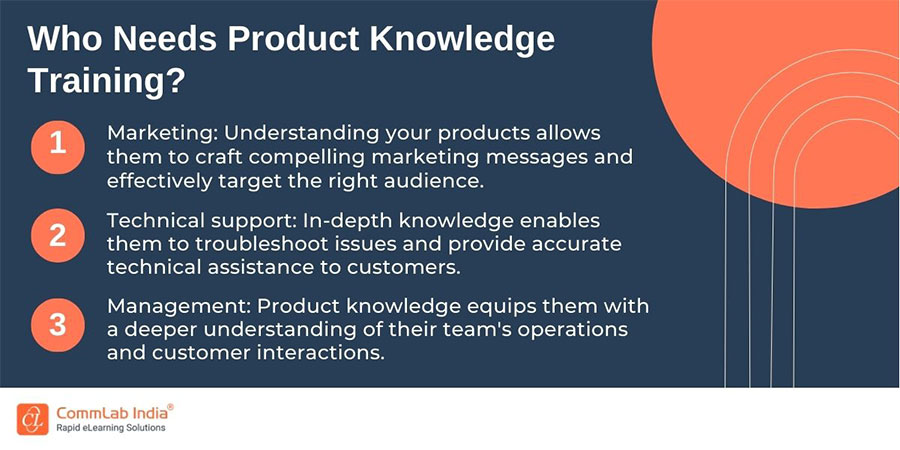Decoding Product Knowledge Training: What, Why, and How?
Read on to explore how effective product knowledge training empowers your employees, boost your customer experience, and drives business success.

Frustrated customers? Lagging sales? This might be your cue to go over your product knowledge training!
Imagine your sales team confidently handling customer inquiries, highlighting unique selling propositions, and closing deals with ease. Or, picture your customer service representatives resolving technical issues swiftly, leaving customers feeling valued and supported. This is the power of effective product knowledge training. In today's competitive business landscape, a well-trained and informed workforce is the cornerstone of success. This blog will dive into the world of product knowledge training, exploring its importance, benefits, and key strategies to implement for maximum impact.
Product knowledge training empowers your employees to become experts in your products or services.
It equips them to confidently:
- Sell: Explain features & benefits, address objections, and close deals.
- Support: Answer customer inquiries, troubleshoot issues, and provide exceptional service.
- Represent: Understand the competitive landscape and effectively differentiate your offerings.
What is Product Knowledge Training?
Product knowledge training equips your employees with the in-depth understanding and expertise necessary to effectively sell, support, and represent your products or services. This training delves into various aspects of your offerings, including:
Features and functionalities: Comprehensive training on the core features, functionalities, and benefits of your products or the services offered, lets reps to confidently explain these aspects to potential and existing customers.
Applications and use cases: Understanding how your products or services address your customers’ problems and fulfill their needs is very important. Training usually covers different use cases and scenarios to equip employees with the ability to effectively answer customer inquiries and provide personalized recommendations.
Competitive landscape: Knowledge of your competitors' offerings, both strengths and weaknesses, enables your team to differentiate your products effectively and highlight your unique selling propositions.
Customer service protocols: Equipping your employees with the skills and knowledge to handle customer inquiries, troubleshoot issues, and provide exceptional service is essential for building trust and fostering long-term customer relationships.
Why is Product Knowledge Training Important?
Investing in product knowledge training offers numerous benefits for your business, including:
Enhanced customer experience: A knowledgeable and confident workforce can provide exceptional customer service by promptly addressing inquiries, offering personalized recommendations, and demonstrating a genuine understanding of customer needs. This translates to a more positive customer experience, which fosters loyalty and encourages repeat business.
Increased sales conversions: When your sales team possesses in-depth understanding of your products, they are better equipped to identify customer needs, present product features and benefits effectively, and overcome customer objections. This leads to a higher conversion rate and increased sales.
Improved brand reputation: Well-trained employees can accurately represent your brand and communicate its value proposition clearly. This fosters trust and strengthens your brand reputation in the marketplace.
Reduced customer support costs: Employees equipped with the knowledge to answer customer questions promptly and efficiently can resolve issues faster, minimizing the need for escalated support inquiries. This translates to cost savings for your organization.
Boost employee morale and engagement: Providing your employees with opportunities to learn and develop via product knowledge training demonstrates your commitment to their development. This can boost morale, increase employee engagement, and foster a positive work environment.
→ Download eBook: Online Learning for Corporate Training
Who Needs Product Knowledge Training?
While product knowledge training is particularly crucial for your sales as well as the customer facing teams, it is beneficial for various departments operating across your organization, including:

4 Key Strategies for Success in Product Knowledge Training
To maximize the efficacy of your product knowledge training, consider implementing the following strategies:
1. Personalized Training Approach: One size does not fit all. Customize your training programs to the specific needs and roles of different teams. Sales representatives may benefit from in-depth training on selling techniques and competitive analysis, while customer service reps may need more focus on troubleshooting and communication skills.
2. Engaging and Interactive Methods: Ditch the traditional lecture format and adopt engaging and interactive methods like:
- Simulations: Create realistic scenarios where employees can practice applying their knowledge and skills.
- Role-playing activities: Allow employees to practice their communication and sales techniques in a safe and controlled environment.
- Interactive quizzes: Use quizzes to assess understanding and make learning a more interactive experience.
- Gamification: Incorporate game mechanics like points, badges, and leaderboards to boost employee engagement and encourage healthy competition.
3. Video-based Learning and Microlearning: Break down complex information into bite-sized, easily digestible modules delivered through engaging video content. This microlearning approach caters to shorter attention spans and allows for flexible learning on-demand.
What Are the Top 5 Microlearning Services for Training? [Video]
4. Continuous Reinforcement and Measurement: Learning doesn't stop after the training program ends. Implement ongoing reinforcement strategies like :
- Knowledge checks: Regularly assess knowledge retention through short quizzes or challenges.
- Refresher courses: Offer refresher courses to update employees on new features, functionalities, or market trends.
- Opportunities to practice: Provide opportunities for employees to apply their skills in real-world scenarios, such as role-playing exercises with colleagues or customer simulations.

Feedback and Recognition: Create a safe space for employees to provide feedback on the training program. This feedback can be used to improve the content, delivery methods, and overall effectiveness of future training sessions.
Recognize and celebrate employees' progress and achievements in their product knowledge journey. This can be done through individual recognition, team celebrations, or incorporating recognition badges within gamified training elements.
Summing Up
Before signing off, we would like to highlight that investing in your employees' product knowledge is an investment in the future of your business. By providing them with the resources and opportunities to learn and grow, you are equipping them to be your brand ambassadors and contribute significantly to your organization's success. By incorporating the key strategies discussed in the blog, you can create a comprehensive and impactful product knowledge training program that:
Empowers your employees with the knowledge and skills they need to excel in their roles.
Elevates your customer experience by ensuring your team can effectively address customer needs and inquiries.
Drives success for your business through increased sales conversions, improved brand reputation, and a more engaged and productive workforce.
Looking for more ways to empower your employees and drive business success? Download our free eBook: Online Learning for Corporate Training!



![Corporate Training – Ways to Boost Learner Engagement during Corporate Training [Video]](https://blog.commlabindia.com/hubfs/corporate-training-learner-engagement-video.jpg)

